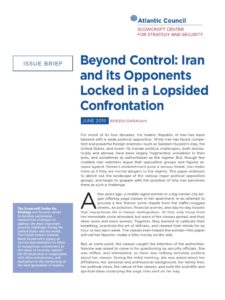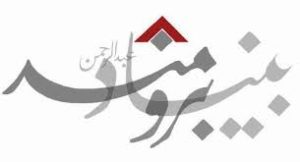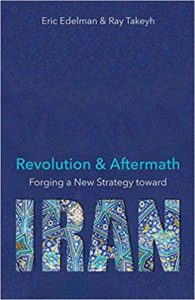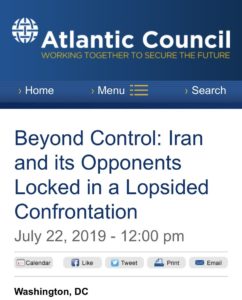At a time of rising tensions between the United States and Iran, various opposition factions within the Iran diaspora are competing to position themselves as a credible alternative to the Islamic Republic, a new Atlantic Council report observes.
Ideologically fragmented, these groups have had limited success in posing a genuine challenge to the regime, which nevertheless views them as an existential threat, Atlantic Council nonresident senior fellow Borzou Daragahi writes in “Beyond Control: Iran and its Opponents Locked in a Lopsided Confrontation.”*
 But, as countless critics of the reformists have pointed out, throwing around fancy terms like “civil society” or “democracy” won’t resolve Iran’s myriad problems, he writes. Time and again, the reformists have failed to match their rhetoric with action, seemingly bowing before the hardliners when challenged, as when [then President Mohammad] Khatami ultimately caved to pressure and condemned the student protesters in 1999.
But, as countless critics of the reformists have pointed out, throwing around fancy terms like “civil society” or “democracy” won’t resolve Iran’s myriad problems, he writes. Time and again, the reformists have failed to match their rhetoric with action, seemingly bowing before the hardliners when challenged, as when [then President Mohammad] Khatami ultimately caved to pressure and condemned the student protesters in 1999.
“The active parties inside Iran are all superficial and demagogic, and seeking material interests while contributing to unfair wealth distribution,” said Mahdi Khalili, a Tehran political scientist.
When they refuse to submit, they are easily pulled out of the game—put under house arrest, as in the case of reformist presidential candidates Mir-Hossein Mousavi and Mehdi Karroubi, or tossed into jail, in the case of hundreds of other dissidents and activists who sought to change the system from within through disputed 2009 elections, Daragahi adds.
“Don’t underestimate the level of repression inflicted after 2009 and the dismantling of civil society,” analyst Ali Ansari said. “Since 2009, the paranoid state has emerged effectively under the security control of the Revolutionary Guard. So domestic opposition was always going to
struggle.”
 Likewise, the 1999 student protests were a lesson for many Iranians who learned that even if reformist politicians supported changes to the law, those changes would be stymied by the unelected clerics who control Iran’s courts and powerful Guardian Council, said Roya Boroumand, the executive director of the nonprofit Abdorrahman Boroumand Foundation.*
Likewise, the 1999 student protests were a lesson for many Iranians who learned that even if reformist politicians supported changes to the law, those changes would be stymied by the unelected clerics who control Iran’s courts and powerful Guardian Council, said Roya Boroumand, the executive director of the nonprofit Abdorrahman Boroumand Foundation.*
Iran and extremists like al Qaeda and ISIS take advantage of proxy wars and vacuums, notes Brett McGurk, the former Special Presidential Envoy for the Global Coalition to Counter ISIL. So it’s in our interests both from a humanitarian, geostrategic, and national security perspective to use diplomacy and other tools to end these conflicts, he told Stanford’s Freeman Spogli Institute for International Studies.
 The Islamic Republic “is a revolutionary state whose entire identity is invested in its hostility toward the West,” analysts Eric Edelman and Ray Takeyh write in Revolution and Aftermath: Forging a New Strategy toward Iran, in which they contend argue a flawed reading of Iran’s domestic politics has hamstrung decades of diplomacy (see below).
The Islamic Republic “is a revolutionary state whose entire identity is invested in its hostility toward the West,” analysts Eric Edelman and Ray Takeyh write in Revolution and Aftermath: Forging a New Strategy toward Iran, in which they contend argue a flawed reading of Iran’s domestic politics has hamstrung decades of diplomacy (see below).
The regime governs the theocratic republic with laws and regulations based on Ja’fari Shia Islam. These prohibit Muslim citizens from changing or renouncing their religious beliefs, according to the Department of State’s 2018 Report on Religious Freedom for Iran.
What are the consequences of the Iranian government’s massive, systematic campaign to spread disinformation about religious minorities through social and traditional media? Watch an in-depth Washington Institute conversation with leading scholars (above):
- Simin Kargar, a researcher on human rights and technology, is an affiliate of the Berkman Klein Center for Internet and Society at Harvard University, where she focuses on hate speech online and the interplay of social media and power.
- Azadeh Pourzand is an independent human rights researcher and executive director of the Siamak Pourzand Foundation, which is dedicated to promoting freedom of expression.
- Hamid Gharagozloo is a representative of the International Organisation to Preserve Human Rights (IOPHR).
Iran uses a number of journalists and ostensibly independent commentators to spread disinformation pro-regime propaganda, notes Maryam Memarsadeghi, a member of the Iran Disinformation Project.
 *To discuss the realities, perceptions, and impact of Iran’s opposition groups, the Atlantic Council hosts a panel discussion that will mark the release of “Beyond Control: Iran and its Opponents Locked in a Lopsided Confrontation.” The discussion will be held July 22, 2019 from 12:00 to 1:30 pm at the Atlantic Council. The event is open to press and on the record.
*To discuss the realities, perceptions, and impact of Iran’s opposition groups, the Atlantic Council hosts a panel discussion that will mark the release of “Beyond Control: Iran and its Opponents Locked in a Lopsided Confrontation.” The discussion will be held July 22, 2019 from 12:00 to 1:30 pm at the Atlantic Council. The event is open to press and on the record.
Introductory Remarks: General James L. Jones, USMC (Ret.), Executive Chairman Emeritus, Chairman, Scowcroft Center for Strategy and Security, Atlantic Council.
A conversation with:
Borzou Daragahi, Nonresident Senior Fellow, Scowcroft Center for Strategy and Security, Atlantic Council
Nader Uskowi, Nonresident Senior Fellow, Scowcroft Center for Strategy and Security, Atlantic Council
Jonathan Winer, Scholar, Middle East Institute
Moderated by: Suzanne Kianpour, Foreign Affairs & Political Journalist, BBC News
On Twitter? Follow @AtlanticCouncil @ACIranSource and use #ACIran
Atlantic Council, 1030 15th Street NW, 12th Floor (West Tower Elevator), Washington, DC.
*A National Endowment for Democracy grantee.







